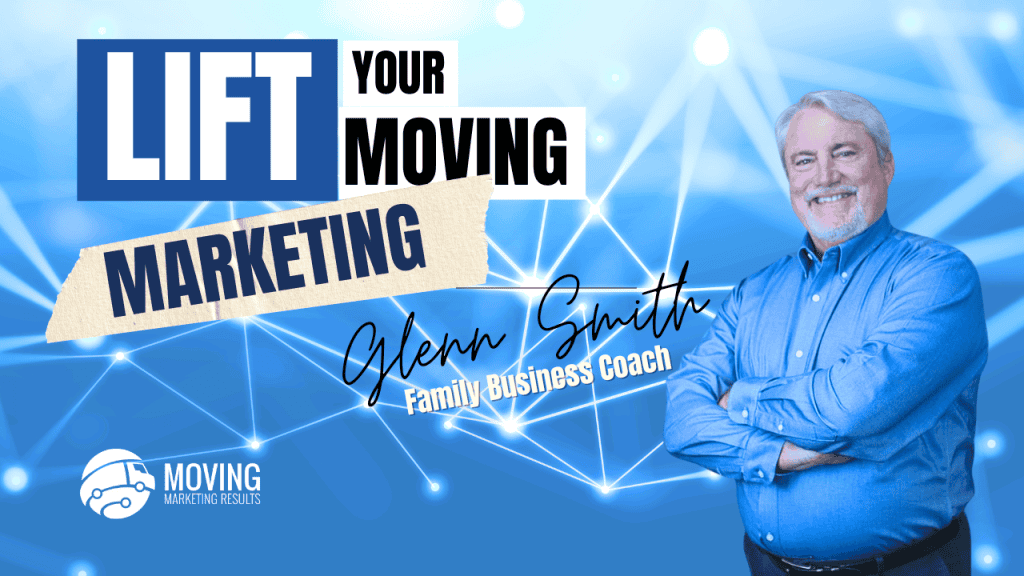Running a moving company is no small feat. But when your business is family-owned, things get even more complicated. You’re not just managing a team—navigating deep personal relationships, making tough financial decisions, and trying to keep work stress from creeping into your family life.
Maybe you started out with your spouse, a sibling, or a longtime friend. At first, it was exciting. You had the freedom to run things your way. But now, the challenges are piling up. Arguments over decisions. Unclear roles. Feeling like you’re stuck doing everything yourself while everyone else coasts. Sound familiar?
The good news? You’re not alone, and there’s a way through it. We recently sat down with family business coach Glenn Smith on the Moving Up Podcast to talk about the biggest challenges family-run moving companies face—and how to fix them.
In this post, we’ll break down key takeaways from our conversation, covering everything from setting clear roles to hiring the right people and scaling without burnout.
Let’s get into it.
The Challenges of Running a Family-Owned Moving Business
When family and business mix, emotions run high. Disagreements over money, leadership, and decision-making can get personal fast. Unlike a corporate job, you can’t just leave work problems at the office—because the “office” might be your dining table.
Glenn shared some of the biggest struggles he sees in family businesses:
- Blurry boundaries. Work talk spills into family time, and personal conflicts creep into work.
- Undefined roles. One person ends up doing way more than they should because nobody set clear responsibilities.
- Hiring pressures. There’s an unspoken expectation to hire family, even when they might not be the best fit.
- Scaling struggles. Growth is tough when you’re reluctant to bring in non-family members or let go of control.
- Succession headaches. No one wants to talk about what happens when the owner steps away, but avoiding the conversation only makes things messier down the line.
If any of these sound familiar, don’t worry. You’re not doomed to a lifetime of family feuds and business stress. With a few key shifts, you can create a smoother, more successful operation.
Defining Roles So Everyone Knows Their Job
The quickest way to create tension in a family business? Not having clear roles. If you’ve ever felt like you’re handling way more than your fair share—or worse, that someone else isn’t pulling their weight—this is why.
Glenn emphasized the importance of an organizational chart. It doesn’t have to be fancy, just something that lays out:
- Who’s in charge of sales?
- Who’s handling operations and scheduling?
- Who’s managing finances?
- Who’s responsible for marketing?
The key is staying in your lane. Once these roles are set, respect them. If your brother is running operations, let him make the calls on truck schedules. If your spouse is handling sales, trust them to bring in leads without micromanaging.
When responsibilities are clear, everyone knows what’s expected, and there’s no confusion about who’s doing what. That alone cuts down on a ton of stress.
Keeping Communication Open and Honest
If there’s one thing that makes or breaks a family business, it’s communication. Too often, people assume their family members just know what they’re thinking. Spoiler: they don’t.
Glenn recommends regular check-ins. Try setting a weekly meeting (yes, even if it’s just two of you) to go over:
- What’s working and what’s not
- Issues that need to be addressed
- Where the business is headed
And here’s the big one: write things down. Keep an issues list so problems don’t get buried under daily chaos. A simple note like “We need to hire a new driver” or “We should revisit pricing” keeps everyone accountable.
The goal? Talk about things before they turn into full-blown conflicts.
Hiring the Right People (Even If They’re Not Family)
Here’s a hard truth: just because someone is family doesn’t mean they should work for you. And just because someone has worked for you forever doesn’t mean they’re the right person to help you grow.
When hiring, Glenn suggests focusing on three things:
- Character. Do they fit the culture of your company? Are they honest, reliable, and hardworking?
- Competence. Can they actually do the job, or will you be constantly covering for them?
- Chemistry. Will they work well with the rest of your team?
Having a structured hiring process helps. Instead of making gut decisions, set up a system:
- A structured interview
- A trial period or skills test
- A clear job description with measurable expectations
This takes the pressure off hiring people just because they’re family or because they seem like a good fit.
Scaling Without Burning Out
Most moving company owners start out doing everything themselves—sales, scheduling, customer service, even jumping in on moves when needed. That’s fine at the beginning, but if you keep going at that pace, you’ll never grow.
Scaling means learning to delegate. Glenn emphasized how important it is to let go of the “I have to do everything” mindset. The more you trust your team, the more your business can grow.
Some ways to start:
- Create systems for scheduling, billing, and customer service
- Use technology like CRM software to keep track of leads and customers
- Hire people who complement your weaknesses
If you’re stuck in the mindset of “nobody can do this as well as I can,” take a step back. Growth isn’t about doing more—it’s about doing less of the wrong things.
Planning for the Future (Yes, Even If It’s Uncomfortable)
Nobody likes to talk about what happens when they retire or step away, but not having a plan can wreck a family business.
Glenn stressed the importance of:
- A clear succession plan so the business doesn’t fall apart if something happens to the owner
- Legal agreements that define ownership and leadership transitions
- Financial planning to ensure a smooth exit strategy
These are tough conversations, but having a plan means your business—and your family—will be in a much better position down the road.
Final Thoughts
Running a family-owned moving company isn’t easy. But with clear roles, open communication, and the right people in place, it is possible to grow without losing your sanity.
At Moving Marketing Results, we’ve seen time and time again how strong leadership and smart business strategies can take family-run companies from struggling to thriving. If you’re looking for ways to grow and bring in more customers, the first step is getting everyone on the same page about where the business is headed.
If you want to dive deeper into these strategies, check out our full interview with Glenn Smith on the Moving Up Podcast. And if you need help with marketing—whether it’s getting more leads, improving your online presence, or just making sure the right people are finding your company—well, that’s what we do best.
Here’s to a smoother, more successful business for you and your family.

